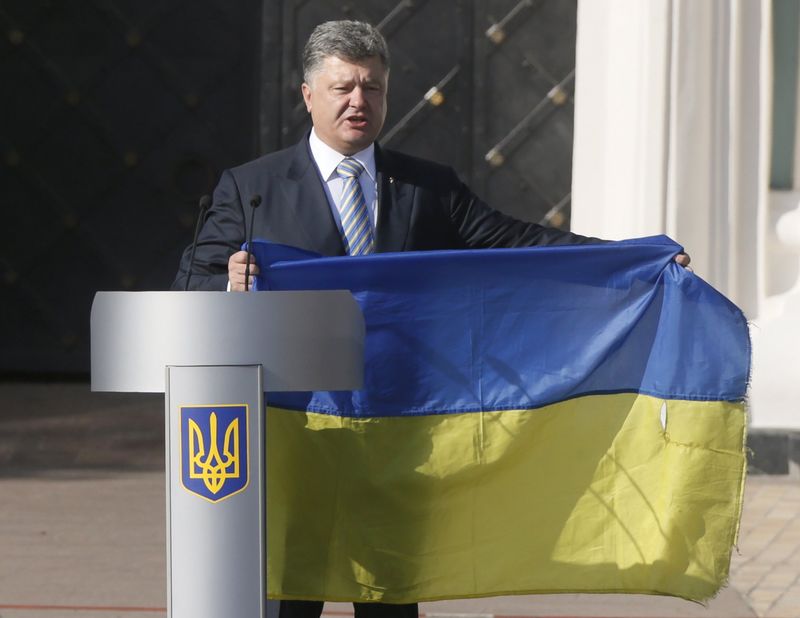By Natalia Zinets and Richard Balmforth
KIEV (Reuters) - Ukrainian President Petro Poroshenko called on all political forces in the country on Sunday to rally behind his plans for constitutional change aimed at ending a separatist conflict in the east and defeating what he termed the "Russian aggressor".
Poroshenko used a flag-raising ceremony in Kiev on the eve of Independence Day to make a clear pitch to his coalition allies to overcome their doubts and vote in favor of amendments to the constitution that will allot special status to separatist-minded parts of eastern Ukraine.
The proposed changes, which will go to a first vote in parliament on Aug. 31, have split the pro-Western coalition and it is touch-and-go as to whether the government will muster the necessary 226 votes to go through to a second reading.
Several coalition allies are under pressure particularly from militant paramilitary groups opposed to giving any ground to Russian-backed separatists who have seized swathes of land in the east.
Referring to Ukrainian blood spilt in the east at the hands of the "Russian aggressor", he said: "My direct call to all political forces, in the first instance to those who are together in the parliamentary coalition, is to come together now for the sake of Ukraine."
Allowing for "decentralization" to give the regions more say in managing their own affairs is part of Ukraine's undertakings made in February in peace talks in Minsk, Belarus, involving Ukraine, Russia, Germany and France, which resulted in a ceasefire agreement.
Poroshenko is likely to give an account of what he has done to honor the Minsk agreement, which includes holding local elections in the east, when he meets German Chancellor Angela Merkel and French President Francois Hollande in Berlin on Monday.
Ukrainian authorities have mobilized huge numbers of police and interior ministry troops to reinforce security for the weekend and Independence Day itself on Monday when there will be a march in Kiev of soldiers serving on the front line.
More than 6,500 people, including hundreds of civilians, have been killed in the conflict. Pro-Russian rebels took up arms in the east after Russia annexed Crimea in March 2014 in response to the overthrow of a pro-Moscow president in Kiev by street protests a month earlier.
Both sides have withdrawn large numbers of heavy weapons from the conflict zone in line with the Minsk agreement but sporadic clashes still take a steady toll of lives daily. Both sides blame each other for the ceasefire violations.
Poroshenko, speaking at a military rally on Saturday, said pressure from Russia and the separatists it backs was likely to last decades.

Kiev and Western governments, which have imposed sanctions on Russia, say there is irrefutable evidence of Russian involvement in the separatist resistance. Moscow denies it is providing men or arms.
(Writing By Richard Balmforth; Editing by Susan Fenton)